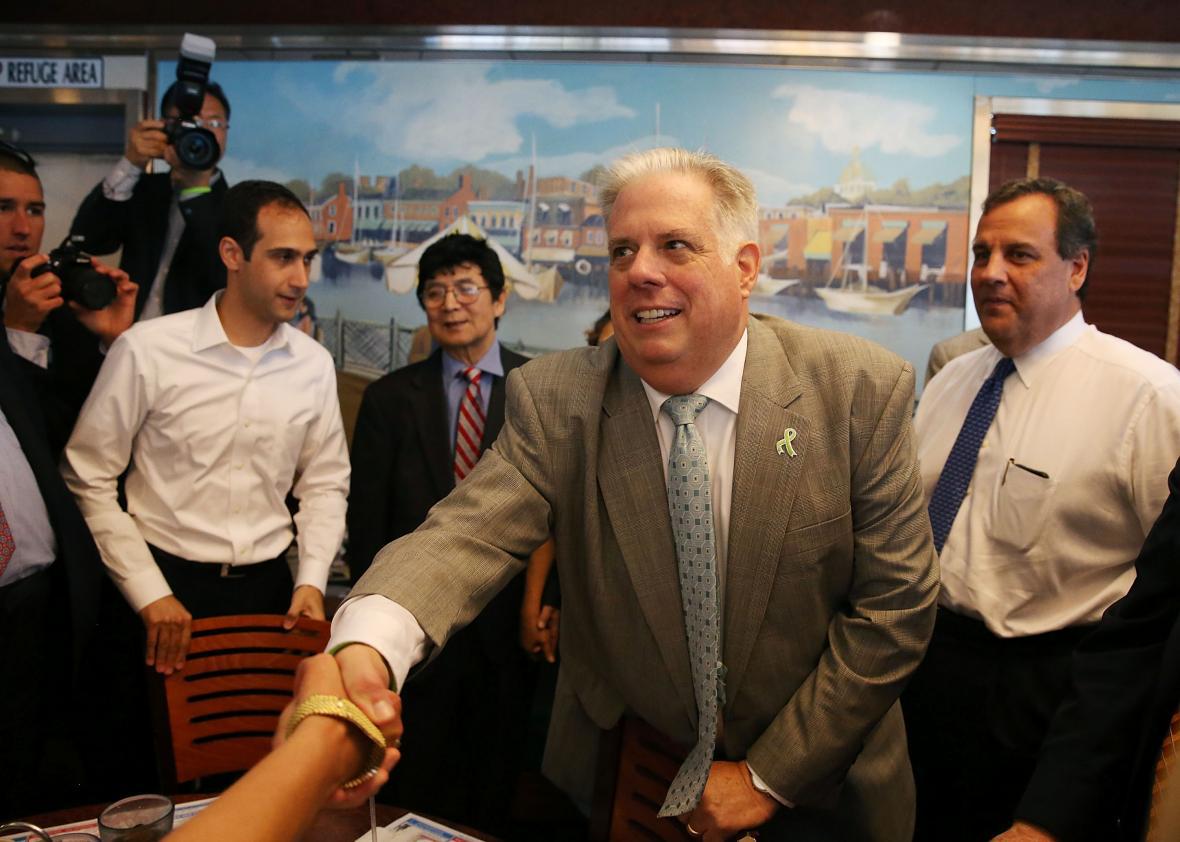Maryland is a deeply Democratic state with a Republican governor, Larry Hogan, who portrays himself as a centrist. Before the election, Hogan disavowed Donald Trump and declared that he would not vote for him—a very popular move among deep-blue Marylanders. But after the election, Hogan began to soften his anti-Trump stance: The governor congratulated Trump on his victory, insisted that everyone should “give the new administration a chance,” attended Trump’s inauguration, and repeatedly declared his intention to work with the president.
On Monday, Hogan once again distanced himself from Trump, albeit slightly, stating at a public forum that while he wants to foster a “working relationship” with the Trump administration, he is not “a defender” of it. Recent events, however, show that this is not quite true. In Maryland, the state attorney general must receive permission from the governor before launching certain litigation, including lawsuits against the president. On Feb. 1, Attorney General Brian E. Frosh requested permission to sue Trump in an effort to halt his travel ban. The governor did not give him permission. And nearly two weeks later, he still hasn’t.
Frosh, a Democrat, believed that Trump’s immigration executive order unconstitutionally harmed many Marylanders—specifically, foreign students who suddenly risked being trapped overseas and cut off from their studies in the state. The executive order therefore threatened to deprive colleges of talented international students (and faculty). Because public universities are an organ of the state, an injury to them constitutes an injury to Maryland, giving the state standing to sue in court. But instead of granting Frosh permission to sue, Hogan’s office requested more information. When Frosh provided that information, the office didn’t respond.
By that time, litigation against the travel ban was moving very quickly. Hogan’s delay had already prevented the state from defending the rights of international students attending its universities. Had a federal judge in Washington not blocked the ban nationwide, these students might have been stuck overseas because of Hogan’s refusal to respond to Frosh. When the Democrat-dominated state Legislature found out about the problem, it proposed a joint resolution to let the attorney general file lawsuits without permission from the governor. At that point, Hogan finally addressed the issue publicly, calling the maneuver “unfortunate, rank partisanship.” The Senate has already passed the resolution, and the House is expected to pass it this week. Hogan cannot veto a joint resolution.
With this legislation taking shape in the background, it’s easy for forget a key fact: Hogan still hasn’t actually told Frosh whether or not he can sue Trump. Hogan’s office told the Baltimore Sun that the governor hadn’t responded because he assumed Frosh had decided to proceed with the suit. He assumed this because Frosh signed onto an amicus brief filed with the U.S. Court of Appeals for the 9th Circuit arguing that the executive order is unconstitutional. But that assumption is absurd. There is a huge difference between signing onto an amicus brief in existing litigation and filing a lawsuit of one’s own. Maryland law allows the former without gubernatorial permission but requires the governor’s permission for the latter. It is simply laughable to say, as Hogan’s office has, that because Frosh signed onto an amicus brief, he has decided to move forward with the suit itself.
On Monday, the attorney general’s office confirmed to me that it has not yet received an answer from the governor either allowing or rejecting the proposed lawsuit. (The governor’s office did not respond to repeated requests for comment.) Until it receives such an answer—or until the law changes—it remains legally barred from filing suit. Hogan, in other words, is holding up litigation against the immigration ban with his silence. He may not be defending the Trump administration, but he certainly appears to be running interference.
